
Dafydd ap Gwilym is regarded as one of the leading Welsh poets and amongst the great poets of Europe in the Middle Ages.

James V was King of Scotland from 9 September 1513 until his death, which followed the Scottish defeat at the Battle of Solway Moss. His only surviving legitimate child, Mary, Queen of Scots, succeeded him when she was just six days old.
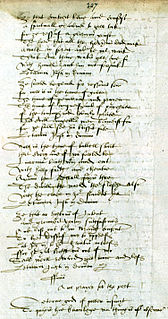
George Bannatyne (1545–1608), a native of Angus, Scotland, was an Edinburgh merchant and burgess. He was the seventh of twenty-three children, including Catherine Bannatyne, born of James Bannatyne of Kirktown of Newtyle in Forfarshire and Katherine Tailefer. He is most famous as a collector of Scottish poems. He compiled an anthology of Scots poetry while in isolation during a plague in 1568. His work extended to eight hundred folio pages, divided into five parts. The anthology includes works from Scottish Chaucerians as well as many anonymous writers.

Simon Robert Armitage, is an English poet, playwright and novelist who was appointed Poet Laureate on 10 May 2019. He is also professor of poetry at the University of Leeds and succeeded Geoffrey Hill as Oxford Professor of Poetry when he was elected to the four year part time appointment from 2015–2019.

Sir David Lyndsay of the Mount was a Scottish herald who gained the highest heraldic office of Lyon King of Arms. He remains a well regarded poet whose works reflect the spirit of the Renaissance, specifically as a makar.

William Dunbar was a Scottish makar poet active in the late fifteenth century and the early sixteenth century. He was closely associated with the court of King James IV and produced a large body of work in Scots distinguished by its great variation in themes and literary styles. He was likely a native of East Lothian, as assumed from a satirical reference in The Flyting of Dumbar and Kennedie. His surname is also spelt Dumbar.
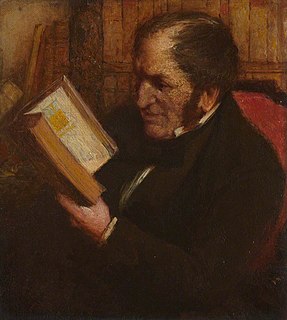
David Laing LLD was a Scottish antiquary.
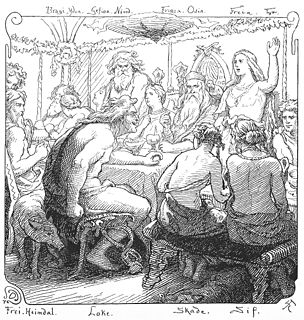
Flyting or fliting is a contest consisting of the exchange of insults between two parties, often conducted in verse.
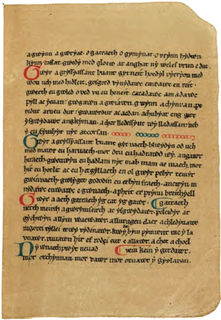
The Book of Aneirin is a late 13th century Welsh manuscript containing Old and Middle Welsh poetry attributed to the late 6th century Northern Brythonic poet, Aneirin, who is believed to have lived in present-day Scotland.

A makar is a term from Scottish literature for a poet or bard, often thought of as a royal court poet.
The Complaynt of Scotland is a Scottish book printed in 1549 as propaganda during the war of the Rough Wooing against the Kingdom of England, and is an important work of the Scots language.

The Lay of the Last Minstrel (1805) is a narrative poem in six cantos with copious antiquarian notes by Walter Scott. Set in the Scottish Borders in the mid-16th century, it is sung by a minstrel late in the 1600s.

Elizabeth Melville, Lady Culross (c.1578–c.1640) was a Scottish poet.

Schir Johine the Ros, ane thing thair is compild, also known as The Flyting of Dumbar and Kennedie, is the earliest surviving example of the Scottish version of the flyting genre in poetry. The genre takes the form of a contest, or "war of words", between two poets, each trying to outclass the other in vituperation and verbal pyrotechnics. It is not certain how the work was composed, but it is likely to have been publicly performed, probably in the style of a poetic joust by the two combatants, William Dunbar and Walter Kennedy, before the Court of James IV of Scotland.

The Bannatyne Manuscript is an anthology of literature compiled in Scotland in the sixteenth century. It is an important source for the Scots poetry of the fifteenth and sixteenth centuries. The manuscript contains texts of the poems of the great makars, many anonymous Scots pieces and works by medieval English poets.

Literature in early modern Scotland is literature written in Scotland or by Scottish writers between the Renaissance in the early sixteenth century and the beginnings of the Enlightenment and Industrial Revolution in mid-eighteenth century. By the beginning of this era Gaelic had been in geographical decline for three centuries and had begun to be a second class language, confined to the Highlands and Islands, but the tradition of Classic Gaelic Poetry survived. Middle Scots became the language of both the nobility and the majority population. The establishment of a printing press in 1507 made it easier to disseminate Scottish literature and was probably aimed at bolstering Scottish national identity.

Poetry of Scotland includes all forms of verse written in Brythonic, Latin, Scottish Gaelic, Scots, French, English and Esperanto and any language in which poetry has been written within the boundaries of modern Scotland, or by Scottish people.
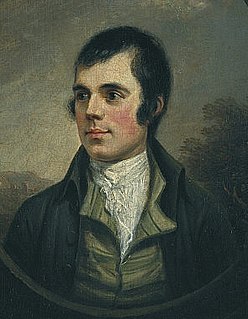
Scots-language literature is literature, including poetry, prose and drama, written in the Scots language in its many forms and derivatives. Middle Scots became the dominant language of Scotland in the late Middle Ages. The first surviving major text in Scots literature is John Barbour's Brus (1375). Some ballads may date back to the thirteenth century, but were not recorded until the eighteenth century. In the early fifteenth century Scots historical works included Andrew of Wyntoun's verse Orygynale Cronykil of Scotland and Blind Harry's The Wallace. Much Middle Scots literature was produced by makars, poets with links to the royal court, which included James I, who wrote the extended poem The Kingis Quair. Writers such as William Dunbar, Robert Henryson, Walter Kennedy and Gavin Douglas have been seen as creating a golden age in Scottish poetry. In the late fifteenth century, Scots prose also began to develop as a genre. The first complete surviving work is John Ireland's The Meroure of Wyssdome (1490). There were also prose translations of French books of chivalry that survive from the 1450s. The landmark work in the reign of James IV was Gavin Douglas's version of Virgil's Aeneid.

Walter Kennedy, younger brother of John Kennedy, 2nd Lord Kennedy of Dunure. Clan Kennedy. He was parson of Douglas who acquired Glentig in 1504 from John Wallace, and married Christian Hynd.

Mary Maitland was a Scottish writer believed to be the transcriber of the Quarto Volume of the Maitland Manuscripts, an important source for the Scots literature of the Fifteenth and Sixteenth Centuries. She recorded and preserved her father's extensive writings as his sight became increasingly poor, eventually resulting in his blindness.
















